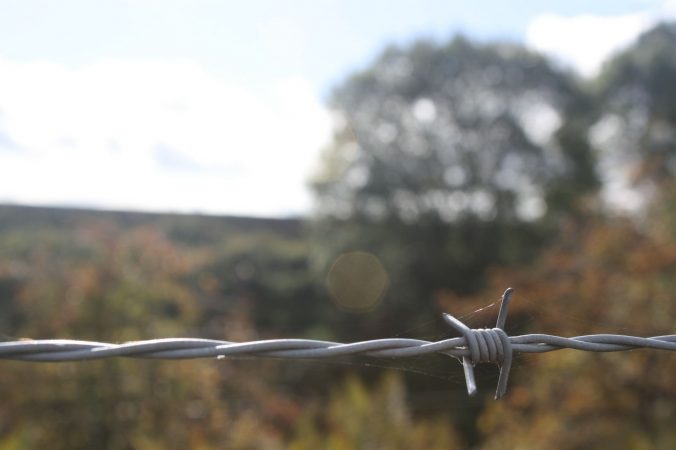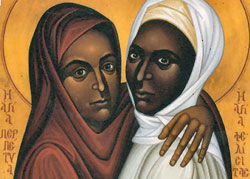A sermon preached on 24 February 2019 at St. Oswald’s, Maybole, Scotland. The readings for the day were the readings assigned for 7 Epiphany, Year C.
Love your enemies.
Pray for those who abuse you.
Bless those who curse you.
Do good to those who hate you.
This has been a difficult week in the news and Jesus is not making it any easier with the Gospel lesson assigned for this week.
Shamima Begum, a British teenager who has just given birth to a beautiful baby boy in a refugee camp in Syria, has been stripped of her UK citizenship. Four years ago, at the age of 15, Shamima stole her sister’s passport and ran away to join the Islamic State – marrying a 27-year-old Dutch convert to Islam who is now a soldier for the IS. She has spent the past few years living, in her own words – as a housewife, giving birth to three children – only one of whom survives, her husband has now been captured and she was forced to flee to a refugee camp when the violence became to great.
Shamima was born, raised, and educated in the UK. She was radicalised by propaganda made by the IS and circulated online. She, and her two 16-year-old friends, made a pact and left the UK together – without knowledge, support, or permission from their parents.
Listening to the interview Shamima gave to the media, you can hear and see as she mumbles and murmurs like a teenager. Her answers are not fully formed thoughts and the interviewer pushes her to think through what she is saying. Her lack of sophistication and obvious immaturity are striking. But the heinous nature of the crimes of the IS against people in the Western world, including those of us living here in the UK, is undeniable. Terrorism, murder, and violent attacks cause us to live in a state of fear. Regardless of Shamima thinking of herself merely as a housewife, many in the UK think of her as a symbol of our enemies and we would rather keep our enemies as far away as possible, thank you very much.
Love your enemies.
Pray for those who abuse you.
Do good to those who hate you.
Bless those who curse you.
In our passage from the Gospel of Luke this morning, we hear a continuation of Jesus’ Sermon on the Plain. Last week we heard some of the beatitudes from this same Sermon – last week’s Gospel talked of the top dogs and the underdogs – reminding us that those who struggle now will be blessed by our God in Heaven and those who are distracted by the material wealth and trappings of this world may enjoy those things now, but woe on them as those distractions also distract one from relationship with God. This week, Jesus gets right down to the nitty-gritty, calling on Christians to love and bless and pray for those whom we’d rather shun, shut out, and turn away. Jesus raises the bar on us, once again, asking more than humanly possible – which reminds us that we are totally dependent on God; because God’s Grace is more abundant and understanding than ours ever can be on its own.
Episcopalians talk a lot about the Love and Grace of God; our liturgy even proclaims that “God is love and we are God’s children. There is no room for fear in Love…”
We listen as the priest proclaims those words each week, but until this week – this news – this Gospel – I didn’t internalize the weight of those words.
There is no room for fear in love.
And yet…
I am afraid.
I am afraid every day because of the violence and hatred around the world. I am afraid of the racism and subsequent abuse and violence I hear about and witness online, and sometimes in real life. I am afraid because of the “active shooter drills” my friends’ children have to practice in their American schools to prepare for the inevitability of another school shooting. I am afraid, because a 15-year-old British schoolgirl can watch videos online that convince her to run away from the love of her family to find a supposedly better life in the arms of a terrorist organization. I am afraid.
There is no room for fear in love. But I am still afraid.
I am afraid and I also wonder, what the news would have been this week if the British schoolgirl in question had white skin? Would we be so quick to make her stateless if she looked more like “one of us?” I know this is a complex question, especially considering the recent history of domestic terrorism in Northern Ireland, but I still wonder…
There is no room for fear in love. But I am still afraid.
We are all afraid, a lot of the time. Our fear prevents us from doing big things and small things. Our fear causes us to give up on dreams, close ourselves off from opportunities, and to settle for something less than the goodness God wants for us.
I am here with you today in my role as Canon Missioner. I am here to get to know you and to celebrate the successes of your Mission Action Planning and to look boldly towards your future mission. I doubt very much most of you expected me to come here today and to preach a sermon that could be considered so controversial; I assure you, no one is more surprised than I am. But, you see, living our lives as disciples of Jesus Christ is controversial. This is a necessary fact because Jesus was a radial figure in his own time and still is today. Jesus was God made human, who came to earth preaching a Gospel of impossibly possible Love, impossibly possible Grace, and impossibly possible Forgiveness. He didn’t shy away from taking a stand against tyranny, oppression, legalism, and hatred; and he pushed his followers to do the same. Jesus was so controversial he was eventually nailed to a tree.
Our call as Christians in this place and time is to bring Jesus’ radically inclusive message of impossibly-possible Love to the world we live in today. And that message is desperately needed. Anyone who has spent any time reading the comments section on an article on the Internet knows that-Love is needed. Anyone who has spent time walking the halls of a secondary knows that-Love is needed. Anyone who struggles with depression, anxiety, addiction, or fear knows that-Love is needed. So how do we find where is God calling St. Oswald’s in your future mission? I’d start by asking the question: “who most needs that-Love (God’s Love) right now?”





Recent Comments